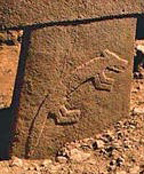
Two recent archaeological discoveries point to complex
civilizations that could alter our understanding of human development.
The first, a 12,000 year old temple complex in southern Turkey, is twice as old
as Stonehenge and the Great Pyramid. What is remarkable are the carvings of
boars, foxes, lions, birds, snakes and scorpions. More amazing is that it is
thought that the people who built it did not have pottery or cultivate wheat.
They lived in villages but they were not farmers; they were hunters.
“Everybody used to think only complex hierarchical civilizations could build
such monumental sites, and they came about with the invention of agriculture”,
says Ian Hodder, Stanford Professor of Anthropology. The Gobekli Tepe site
changes everything. “It's elaborate, it's complex and it's pre-agricultural.”
Klaus Schmidt, who found the site, thinks that the large stones may be the
earliest representations of the gods and that the “site may be the last
flowering of the semi-nomadic people that farming was just about to
destroy...those who built it buried it under tons of soil, as though its wild
animal-rich world had lost its meaning. In my opinion, the people who carved
them were asking themselves the biggest questions of all: What is this universe?
Why are we here?
The second, a 7,000 year old site in the Fayoum Oasis about 50 miles southeast
of Cairo, gives us a picture of what life was like a thousand years before the
Pharonic era. In this farming village the residents grew barley and wheat and
raised sheep, goats and pigs.
The remains of domesticated plants and animals were not native to Egypt. All
were originally domesticated about 11,000 years ago in the Tigris-Euphrates
watershed. While agriculture probably flourished in the Nile Valley, evidence
has been obliterated by flooding and the changing course of the river, making
this find an especially important one.
The depth and the complexity of human civilization on Earth is surely still not
known, as remnants of our past have been buried and flooded, looted and lost.
But what is certain is that we walk on lands that are ancient relative to human
life spans.
Given that there is only so much that can be known of the past, all we can do is
look in awe at those infinite spans of time both behind and ahead of us and
resolve to live the present with meaning, intelligence and love, knowing that
all else will be swept away by the mighty Time.